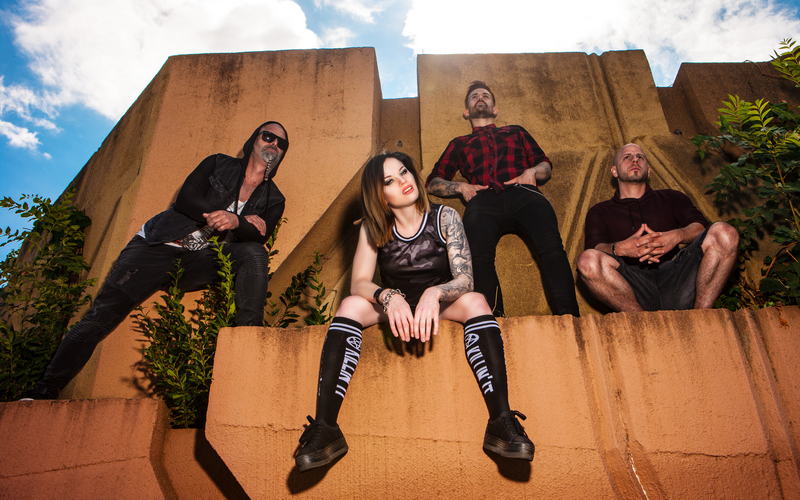Words: Miljan Milekić
Many things came to mind at the mention of the Hungarian band The Hellfreaks, but there is the one that stands out – grinding. One of the most hard-working bands around, they slowly but surely create their own path, re-inventing themselves in the way. The best example of that came in just weeks ago, in the form of their brand new album ‘God On The Run.’ We just knew we had to catch up with them, and once again, singer Shakey Sue, found some time to answer our questions. Check the interview below.

I would kick off with your newest single ‘Adrenalized,’ a bit unusual song for you. Can you tell me a bit more about it?
Sue: ‘Adrenalized’ is a pretty unique song for us because it has a non-typical happy vibe. To avoid any misunderstanding – it’s not that we’re emo kids who are only focused on the hopeless side of life, our songs are full of positive messages. But our vibe is more like a look into the mirror and a punch against it if we don’t like what we see, and not a “don’t forget to smile” cheerleader spirit. This might be my fault, the guys have tried a couple of happy-punk songs with me, but I’m just not able to jump on that wave, and all my vocal ideas seemed way too silly to me. I just don’t feel these kinds of songs. ‘Adrenalized’ was written more or less by accident. We rewrote this song so many times… Somehow, in the end, I came up with a vocal melody and lyrics that didn’t feel stupid to me, and it makes it a lot of fun to play on stage.
You have already released four singles from the ‘God On The Run,’ doing videos for all of them. Is that another testament of how much you believe in this record, and you want to get as many songs as you can under the spotlight?
Sue: I wouldn’t use the word testament, or rather, I wouldn’t say that this is the only reason. I totally believe in all of the songs on the album. I believe in them so much, that I’m 100% convinced that we’ve never written such strong songs before, and I’ve never been so proud of any of our records so far. They are full of unique ideas, they have a better sound than any of our songs before, and I also love the genre mix of it. It’s full of punk, rock, metal, and hardcore elements, and it’s also spiced up with a modern touch. It’s exactly what I wanted to achieve since 2014 when I turned my back on our psychobilly past. After all of our records, I was always insecure. With our last album, we started to walk on a good path, but it’s not comparable to ‘God On The Run’ for me. Luckily, tons of awesome reviews that we’ve received so far prove this feeling. It’s the first time that I’m totally 1000% behind our record, and even if someone doesn’t like it, I wouldn’t care because I’m so convinced about it. This has never happened to me before.
The release strategy of the videos is for another reason, and that’s the change in the music industry. I guess you all might hear that nowadays, it’s a question of consideration if it’s even worth releasing your music as an album because basically, the only reason for this format is to please labels. People just don’t really care about albums anymore. Noone is spending 30 min of their life deciding if they like a band or not. They only do it, if they are already convinced by a song of the band. If you want to get heard, you need to think in singles and if you want to get heard by new people too, you need to be able to share your music with audiovisual materials! From the perspective of a musician, it’s like wasting your – maybe – best ideas, if it’s not getting discovered by new people. And the fact is, that it’s not getting found if there is no music video behind it. I love to do music videos, but it makes life much more difficult for bands because it’s very expensive, and it’s really hard to bring up the extra money for that. But this band is our everything, so we pushed everything we have into it to get heard by new people.
I remember our conversation about the albums with ten songs, and how it usually means that the band kept only the songs they were 110% happy with. With ‘God On The Run’ being a ten-song record, do you feel like that was the case with you?
Sue: I have to admit, the writing process did not start like that. We’ve always had more songs on our albums in the past, and I thought that we should continue with 12-13 songs for a record like we used to, but it changed with the writing process, and it’s changed forever now. Our head-of-songwriting is our bass player Gabi. He wrote the instrumental parts of the songs 90% by himself, and I was involved in the process from day one. At some point, he made the decision to close the record with 10 songs. At first, I didn’t agree but after a while, I realized that he is totally right. We had more songs for the album, but they were different, they didn’t fit with the rest, or were on a different level. Or we were afraid that they would not get the attention that they deserve. As mentioned before, people are not listening to albums anymore, so we did not want to “waste” good songs, just to release a longer album. I think 10 songs, especially for this kind of music, are just perfect to wrap into an album, and I think we will continue our upcoming releases with this mindset.
I’ve been following your work on this album and saw that this time you did a lot of the stuff differently, some of them for the first time. So, tell me more about the creative process itself, and how different was it from the previous records?
Sue: We changed everything compared to the past. Every step of it. First of all, we took out the time pressure part of it. We always had deadlines to follow. But this time, we started to work on it more than 2 years ago, and we only released it when we felt that it’s ready. Songs were not written in the rehearsal room anymore. They were written in a small room, in front of a computer. Of course, after a certain point, our guitarist and drummer also added their ideas, but the root of all the songs came from our bass player. That means that the actual recording of the songs happened only after many-many demos.
The vocals were not recorded in a studio. We recorded them at home. I live in a very old flat, which had a tiny storeroom for food. My fridge is empty anyway all the time (laughs), so there was no use for it, so I realized a big dream of mine and built a noise protected room to practice and record vocals. That was an incredibly big life improvement for me. I also have a normal job and when it comes to time management… To keep it short, it is a huge help, that I’m also able to practice in the middle of the night and don’t need to rent a rehearsal room somewhere else out of the city. There is also no more pressure when it comes to recording the vocals. If I have had a bad day, we could continue it the next day without losing money, without stressing myself by checking the time, which would be the case at a normal studio. But if all that would not be enough change compared to the last records: it’s also the first time that we have involved producers in the creative process. We had Paul Miner (New Found Glory, Atreyu, Death By Stereo) for pre-production, Evan Rodaniche (Escape The Faith, Powerman 5000, Lacey Sturm) for the production/mixing phase, and Tom Waltz for the mastering to mold our songs and ideas into the most perfect shape.
Although ‘Astoria’ is probably my favorite album, because of the more straightforward punk rock sound, ‘God On The Run’ offers so much more musically. Can you tell me more about the writing process, what pushed you to explore so many different influences?
Sue: I know many people are afraid to change, but we’re huge fans of it. Change brings improvement, it’s as easy as it sounds. With every record, with every song, we’re learning something about ourselves and the others in the band. Some skills are getting stronger and others, are moving out of the spotlight. From song to song, we try to zoom into what we’re really good at, or what we really enjoy doing. We are four different people, listening to different music, and we all hate to do the same again and again, that’s why our genre range might get wider and wider. Personally, I’ve learned and practiced a lot in the last three years, thanks to my new vocal coach, and the possibility to be able to practice at home. I guess that improvement helped me to try out new things that I didn’t try before. We’ll see where this journey brings us. (laughs)

Lyrically, you kept things personal but also went back to explore different subjects, from books to your love for the occult. How important was it for you to be able to write about whatever you want to write about? On the previous records, did you ever feel the pressure of what you should, or should not write about in your songs?
Sue: Yes, I totally felt the pressure on our first two records back in 2010 and 2012 when we were living our psychobilly days. But this was just one of the 100 reasons I wanted to split from our psychobilly roots. That genre was choking me in so many aspects. It is important for me to write without limitations, especially as I’m not the kind who writes all the time, and who would just have to pick out one of the hundred lyrics that are already written when it comes to a new song. It takes me ages until I’m happy with my own vocal lines, so if there are more limitations than just myself, it can be really frustrating.
As I said, you already released four videos for singles from this album. You’ve always been putting a lot of work into this aspect of your band, but this time, it seems like you took it on another level. How hard was it to outdo yourselves in every single thing for this record?
Sue: It wasn’t hard, we were burning for it! We couldn’t wait to show the new songs to our audience, and there have been a lot of ideas around the videos as well. The day we released our first single from the album, ‘Men In Grey,’ with the video was like Christmas as a child to me! Especially all the amazing feedback that we received, it was the best moment of 2019 for me! The only hard thing was and is always the financial background, which is easily causing some desperate times for a band like us. I know there is no topic that could be less cool, but I don’t want to hide the real side of this story.
Once again, you worked heavily with Mihaszna Film. It seems like you guys have grown together – as you grew and developed as a band, they also developed in what they do. Do you think you actually pushed each other forward to be better?
Sue: We would feel honored if we would be part of their development, but honestly, the guys are rising without our help. (laughs) We’ve worked with them since 2016 when we recorded our first music video for the song ‘I’m Away.’ Since then, the guys became really good friends of ours. Of course, we’ve learned a lot from each other, we’ve learned what they are especially good at, we’ve learned what kind of ideas work better for us, and we’ve learned how we work the most efficiently together. Maybe that’s why you might have seen some development in the videos because we’ve learned to work better as a team. But Mihaszna Film are doing many videos for many local bands, so they are surrounded by the possibilities to grow bigger.
Along with your career in music, you also work as a model. Do you think that modeling experience helped you in your music career, especially when it comes to being on stage or working on music videos?
Sue: I previously worked as an alternative model in Germany, but I haven’t done that since our reunion back in 2015 when I moved back to Hungary. There are no possibilities for that over here. Actually, I was never thinking about that, but I don’t think that it has anything to do with my stage presence or with our music videos. Of course, I don’t feel uncomfortable in front of a camera, which my bandmates definitely do, but that’s all I guess.
I loved my years of modeling, I really enjoyed it, but to be honest with you, that world, that job is all about fakeness. Which is fine in that case, because you are not “selling” yourself in those cases. It’s about slipping into other roles, which can be very exciting. We even had a kind of motto with my model friends – we always said, that a pose in front the camera “looks the best when it hurts,” because there is just nothing natural in those poses. Nothing natural at all! But if you’re not natural on the stage, your fakeness can be smelled a million miles away! It is something totally different, and I think it’s way harder to reveal the real you on the stage than pretending to be someone else in front of a camera.
Follow The Hellfreaks:
Website:www.thehellfreaks.com
Facebook:facebook.com/thehellfreaks
Instagram: instagram.com/thehellfreaks
Youtube: youtube.com/user/TheHellfreaks


